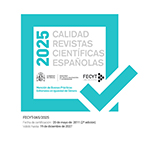The Creole Triennium of Buenos Aires from a Transatlantic Perspective
Abstract
This article examines the reformist experiment, known in Argentine historiography as the “feliz experiencia” (happy experience), that took place in Buenos Aires between 1821 and 1824. The selected case formed part of the ideological climate that spanned the Atlantic within the context of the European liberal revolutions. Diverse strands of liberalism with republican and enlightened narratives converged in the reforms implemented during that triennium. Their principle objectives were to modernize the political, social, economic and cultural environment and to establish a legitimate and stable order. From a perspective of political and intellectual history, this study centers on two focal points. The first focuses on the constitutional question and the available political languages on which the reformist experiment of the La Plata region was based; the second explores different conceptions of the links between society and political power. Both focal points enable us to recover the close connections showcased in the great experimental laboratory that was the Atlantic world during those years, and the variations that revolutionary, constitutional and liberal principles could adapt in each case.
Downloads
Article download
License
In order to support the global exchange of knowledge, the journal Revista Complutense de Historia de América is allowing unrestricted access to its content as from its publication in this electronic edition, and as such it is an open-access journal. The originals published in this journal are the property of the Complutense University of Madrid and any reproduction thereof in full or in part must cite the source. All content is distributed under a Creative Commons Attribution 4.0 use and distribution licence (CC BY 4.0). This circumstance must be expressly stated in these terms where necessary. You can view the summary and the complete legal text of the licence.











